 The Letter F / Kevin H. The Letter F / Kevin H. No second chance for Foxibeau. Foxibeau blew it. We went to one class together, and he was told not to come back. Should Foxie be afforded a second chance? A chance to redeem himself, to show how much he has improved in one week? Apparently not. Off leash among other small dogs, Foxie growled and jumped at the pant leg of a preteen boy rushing past him. Any sign of aggression just isn’t acceptable, the instructor said. She gave us a week to improve, had second thoughts and emailed me not to come back to the class.
Faced with this disappointment, I truly appreciate how the teachings of the Buddha and my sitting practice have increased my equanimity and willingness not to blame. Naturally, I continue to love the dog, and I can continue to appreciate the young woman who teaches the class even as I wonder about her decision to let the small dogs off leash so soon. It seems to me instructing people who came with the dogs not to run might also have been a good idea. At least Foxie would have benefited from the suggestion. As she is SPCA and I a novice, I bow to better judgment.
For the most part, I am not disappointed with Foxie’s performance during his first class among other small dogs. He sat, touched the palm of my hand with his nose, turned toward me when he heard his name. If only he hadn’t growled and heaved his 11 lbs in the direction of a kid’s pant leg as it raced past him in pursuit of its own dog. If only the instructor had said follow your dog and don’t run. Be mindful of the other small animals that may be in your path. There might have been a different outcome. Oh well. We won’t be suing or asking for a reprieve. Probably we will be assigned a private trainer from the SPCA. And we will get a refund.
Feeling apprehensive on the morning of class, I met with friends who told stories about their own small dogs, their success or lack of success with trainers and dog classes. I really appreciated hearing that the small animals of these perfectly delightful people weren’t 100 percent successful in meeting socialization expectations. But as the day went on, my apprehension increased until I had to go a movie to redirect my mind.
By the time Foxiebeau and I got to the SPCA training room, I was equipped with a kong stuffed with kibble and Dogbutter. (I could not risk buying peanut butter because it’s a challenge for me if there is a spoon anywhere, or a fork, or knife.) I bought a bathmat for Foxie’s comfort on the cement floor. We also purchased an attachable pouch and filled it with tiny treats to ensure happy outcomes.
As for happy outcomes, I fear Foxie caught fleas and he doesn’t like the kong or the Dogbutter, which I won’t eat. The pouch could be flatter as it sticks out when attached. Did I mention we get a refund? And finally I send sympathetic joy to all successful small dogs in the basics class and give compassion to Foxibeau. Much gratitude to those who know more than I for their advice and for making hard decisions. Happiness and peace to all rescued animals and to those who care about them under all circumstances.
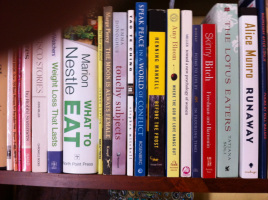 Books I own but haven't written Books I own but haven't written Whenever I feel the urge to write a book, I sit until a title arises. The book for which this blog entry could be a chapter goes by the title Full of Vowels and Consonants: Signifying Nothing. Perhaps it is my Masters Degree in Style and Rhetoric that obliges me to undertake this close reading of the first line of the Beatles’ song “We Can Work It Out” – “Try to See It My Way.”
Unlike the paper I wrote for my Masters in S & R, a solo act, if you want to play along, you may. To get started, speak the line aloud as if it matters. You have some choices in how the words get said. If you can move your head outside the song itself, you could adopt a querulous tone, like it’s not the first time you have suggested this. Emphasize the “try,” dragging out the word until it sounds six to ten letters longer. Let your voice be whiney. You might mentally add an exasperated “please” in front of the “try.”
For an alternate reading, place the emphasis on “my,” implying that in the past you did your fair share of listening to the one or ones whom you now address and, with some expectation of fairness, you rely on an unspoken hope for reciprocity.
To continue, I am assuming a relationship between the original speaker and the significant other(s); ergo I locate the nexus of the problem with the pronouns, both present and missing.
Of the four sentence types, this one under consideration is an imperative sentence. It gives an order to someone unnamed but open to hearing it. I assume so because the song continues, suggesting that whoever received the first line hung around to hear the next 31.
The unincluded “you” at the start of the line is a big mistake, relationship-wise. As another song suggests, “It takes two to tango.” And to omit the necessary other indicates to me that the other doesn’t matter as much as the intensity of the asker’s need to get his needs met, regardless of the feelings of the “unnamed” other.
Consider “Roxanne!” by The Police: “Roxanne/ You don’t have to put on the red light…. The first line shouts the woman’s name. The second line shouts “You.” It doesn’t assume she knows to whom the words are addressed. Roxanne has to know the words are for her. The intensity of that energy signifies deep almost “I-Thou” intention, ala Martin Buber. Roxanne hears herself named about 25 times. There can be no mistake!
From the get go, then, without a named recipient, the Beatle’s line “Try to See It My Way” reveals itself to be hopelessly self-centered, uttered by one whose desperation is directed toward relieving private angst, pain that results from not being understood. This resonates with me. I don’t like it one bit, myself. It seems to happen often.
Now let’s consider the pronoun “it”. Somewhere is the referent, the situation or meaning that “it” denotes. Do the two in this one-sided plea understand what the “it” is that needs to be seen “my way”? I doubt it. This lack of specificity strikes me as purposefully vague and intended to put the other at a disadvantage as her or his mind searches for what exactly is “it”. Her or his “it” might not coincide with the singer’s “it.” A more relationship-savvy person would have clarified “it” and dissipated the surrounding vagueness.
And last but not least is the real problem pronoun “my.” Buddhist studies invite me to grapple with confusion arising from being “me” and not being a “me” who is a separate self. I am the “me” of causes and conditions and this “me” is a delusion that will clear up once I get it. In the Beatles’ “Try to See It My Way” line the confusion presents itself. Since all are one and not separate, the singer’s way is the same way as every way or at least not a way to be insisted upon as the right way. Clearly, it is one way and saying so would be a more open way of asking to be heard.
I hope my exegesis on the first line of the Beatles’ tune helped to clarify issues you might be having with your own communication. Although I am, as always, open to alternate explication, please try to see it my way. Thank you.
 Taken in Halifax, NS / meddygarnet Taken in Halifax, NS / meddygarnet At almost 6 a.m. it’s still dark in the Safeway parking lot when I drive past the store’s lit windows. Some market decorators have launched red and pink valentine balloons and streamers; though it’s gaudy, it’s beautiful. A vivid reminder of the upcoming Valentine’s Day for which I have no plans.
Emails for restaurants still taking reservations remain unopened. I am ambivalent about asking to celebrate with my once-lover or trying to spend time with the dear friend who is busy making valentine sugar cookies for her bakery business and who hasn’t a lot of time because she now works two jobs.
Because at the moment we are passing a store full of red hearts and pink streamers and I am cradling Foxibeau the dog in the crook of my arm, I think of gifting him a pink squeaky heart-shaped toy. A present to the dog may be this year’s show of love to another.
This is not to say love isn’t in my heart. It is and not just because store decorations have given me the seasonal go-ahead. The love I call love feels quiet and tentative as if exuberant, joyous declarations might summon a loud “Shut up!” And I really don’t want to hear anyone, especially myself, say something dismissive like: “You love a dog?” As if this means I’m lacking. Or “You love yourself? Shouldn’t you be beyond self-centered by now?” Perhaps alluding to the Bodhisattva vow to save all beings.
If loving myself means I invest energy and money to regulate my nervous system and to plow through parts and pieces of this self I find problematic, then yes, that could be called self-centered. Yet calling it so would be a mistake. Smoothing out and soothing frees up energy to direct toward being present and perhaps even temporarily “saving” a few beings whose lives intersect mine.
Love of the self feels more like appreciating an ally than treating myself like an object in search of approval. This love feels like a best friend, like a pink angora sweater worn with a tuck-in peter pan collar identical to the one my best friend is wearing.
It feels like the plump tufted brown pillow my therapist placed beneath my feet before she guided my imagining to experience being swooped up out of the reach of a barbed-wire swirl of self-criticism by a large monkey lest I be overwhelmed. This protective mother monkey swings my six-year-old self high among tree branches. Once out of harm’s reach, the large monkey cuddles and soothes until my curiosity sends me scampering to the ground amid a swarm of playful baby monkeys who groom and play with each other and with me. I let their brown softness and the feel of the pillow remind me of Foxibeau, who runs into my mind to join in as I rest in the comfort of safety from my critical, suffering self.
I feel love as I listen to a story a friend tells about her habitual morning walk around Stowe Lake before sunrise. She recounts recognizing a homeless man bedded down at the boathouse and calling to him: Eddie, are you okay and warm enough? He assures her: Doin’ just fine, thanks. Then he says no to the money she offers him to buy a warm jacket. Resuming her walk, she and the other morning joggers hear Eddie’s voice yell out her name. I love you, Valerie, he yells. If you ever aren’t married, I’ll marry you!! She yells back her no thanks she’s going solo, as other joggers, older Asians, not understanding his outcries rush to her to be reassured she is safe.
This feeling I call love is gently laced with humor; it is love that giggles at the raspy sound of a growing growl in a little dog’s throat. It’s hard not to smile. Hard not to laugh although shushing is surely required.
It is a gift to myself of comfort and forgiving. In my mind-heart I hold the image of a loving presence fierce to protect the child in me from the pain still aching to be healed. And this love’s authority commands in her kindest voice that “Shut up” be vanished from the heart’s vocabulary. With love and gratitude, I wish those who read here: a happy Valentine’s Day.
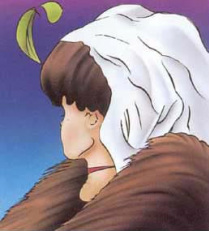 chica o vieja / unknown chica o vieja / unknown I have heard it said that aging affects our perception of time so that it seems to pass faster. My own experience confirms the theory and rather than see this as a problem, I look at it as a reminder that my consciousness needs to transform pretty fast if I am to do what I have set out to do.
In older age this goal is to transcend and transform whatever gets in the way of belonging in and connecting to the universe – a wordy way of saying I feel the need to get out of my own way.
Naturally, my way of seeing the world has been limited and distorted by what I inherited and from how society shaped me. This is why a paradigm shift matters. Thus I set out in search of such a shift, aware that society shifts when individuals widen their conscious awareness.
For this to happen, I thought I would watch for moments or occasions when I did not slip too quickly into the habitual. Because I don’t usually seek out pain, I was willing to experience rolfing. Maybe there would be a paradigm shift in the deep tissue realigning that rolfers do. A few times I had been hard pressed by a masseuse or two, though never at the deep level of discomfort I had been told to expect from being rolfed.
With no prior rolfing experience, I could not say that all rolfers initiate conversations with the part of the body being treated. I hadn’t expected to be channeling a conversation with my right arm while the tissues on that side of the body were being pressed.
In pursuit of an increased ability to experience the world free of past conditioning, I had sought out treatment from a rolfer for trauma I felt might be getting in the way of maturing. During our initial consultation I told the rolfer I could be carrying trauma in the right side of my body and certainly in the right arm as that body part had been injured when I was three years old. This trauma could have resulted from being immobilized in the hospital for many months as well as from getting my arm caught in the grinding wringer of an old-fashioned washing machine and having mother put the wringer in reverse rather than pulling the plug.
Asked to channel the right arm, I had nothing to say. The right arm couldn’t communicate probably because it was traumatized. Unfortunately the grown-up arm, which might be carrying the little-girl arm, was itself speechless. I suggested the rolfer talk to the left arm as it had not been injured and maybe not traumatized.
I was right. The left arm assured us that it had survived my childhood and myriad accidents occurring throughout the years and was able to say with some confidence that being an arm was not complicated. It advised the right arm to take its cue from her. The arm’s succinct advice was to hold on to whatever gets put into our hands to do or carry. The rolfer encouraged the left arm to continue assisting the right arm until it got the hang of being an arm. Both arms seemed fine with this arrangement, and I had no objections either.
For whatever reason, I was willing for the hour of the rolfing to suspend disbelief in the possibility and value of conversing with my arms. Maybe a paradigm shift had started and would continue in the direction of more openness in general. Maybe I would be opening dialogues with other unexpected parties. I certainly aimed at shifting in the direction of more equanimity with both physical and emotional pain.
I hoped to get out of my way so as to be a peaceful and productive human in this universe, yet it will not be entirely in my hands even as I become willing and able to hold them out. The universe will have something to say about what will come.
 Serotonin from the liquor store / Alison R. Serotonin from the liquor store / Alison R. I needed love, trust and comfort. Without them, I was willing to settle for serotonin. I dashed across the street to the liquor store and grabbed a pint of Ben & Jerry’s or Dryers, something high in calories but mood altering. Feeling desperate, I didn’t glance at the cost of the pint or consider the almost-certain weight gain.
Clearly there had been but one thing to do. Get ice cream. An act of pure impulse – the body crosses the street, the hands push back the glass case cover over the ice cream and the fingers select coffee ice cream with Heath Bar bits. The wallet comes out, money changes hands, the body retraces its steps, the hands tear open the ice cream carton, and the spoon dips and lifts, dips and lifts. The inner world brightens, pleasure grows and soon the pint container is all but empty and the smile and feeling of wellbeing. Ah, ice cream, that reliable best friend and resource for serotonin.
My downward dip was on Labor Day afternoon when I handed over to her owner, Chloe, the dog I kept in July and then housed for the three-day weekend. It was hard enough letting go of bouncy furry happiness, but her owner handed me a check for less than I thought we had agreed on, and I experienced a double loss. Unleashed were bites of disrespect. I could see the logic of paying for two nights of doggie care rather than three days. In other words the amount made sense except that this was not the amount we had agreed upon. Something must be wrong with me that I could not get what I asked for. And thanks to the ice cream for helping me recover my equanimity
I had cause to think of that mood-altering event on Labor Day weekend after this weekend’s visit to my granddaughter’s sixth birthday party about 240 miles south of San Francisco. Lovely as it was to snag a few hugs from my youngest son’s little girl, I found myself sitting in silence among the other families, despite all the good will I felt for the young people who, with their children, comprise a caring community for my son and his daughter.
My grandson and I were the two lone representatives of daddy’s family whereas mommy’s family was, as always, present en masse. Given the active nature of the women in that family, the party was a blow out affair. The other Grandma had even booked a room in a motel at Avila beach and scooted down at 4:30 a.m. to secure the best party spot. The mermaid theme was unpacked, balloons inflated, and it was nonstop party making.
Because I didn’t help, because, because and so on I was feeling left out and out of sorts. And then I spotted neighbor Matt and his son. Neighbor Matt used to live on the corner of the street my son and I lived on in San Pedro when my son was growing up. About four years younger, Matt was a surfer like my son, and I imagine he admired his older friend. Matt matured to be kind, soft-spoken, and clearly still respectful of my son and because of that, caring and kind to me, the mother responsible for such a splendid son. Instantly, I noticed the contrast between how I had been feeling before connecting with neighbor Matt and the relief and release that came once I felt I mattered. Kindness, that source for serotonin!
Neighbor Matt and his son drove back to San Pedro about the time my grandson and I headed back to San Francisco. As we parted, I smiled at this good feeling that came from time spent with neighbor Matt. I knew that whether or not I saw him again, I could re-imagine at will and with gratitude these moments of having felt I mattered. I had needed love, trust and comfort and because of neighbor Matt the feelings had been mine and they were as good as, if not better than, those that came from ice cream.
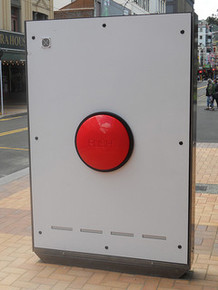 Push/Kristina D.C. Hoeppner Push/Kristina D.C. Hoeppner We all have buttons. Mine is red primarily because the pain is intense. It is the color of danger and detonates (from Latin detonare, to expend thunder) when pushed. This button is hooked up to shame. I can’t think of anything good to say about this button except that it is mine as a gift of my upbringing. For me, shame is a hundred times worse than having the rug pulled out from under me. It is me as a child, reaching out for love and seeing my mother’s frowning face and instead of being held, I am told I smell bad. Feeling shamed undoes trust.
My shame button packs a wallop bigger than any event in the present might warrant. And the resulting blast can blow back the deliberate or inadvertent button-pusher at the same time as I am reeling. Eventually I recover and the pain abates, but the button-pusher may take longer to recover, maybe never. When “never,” a friend is lost.
I had occasion to share an impromptu drawing of this big red button with Corky a day or two after we got back from our Wednesday through Monday trip to Ashland. I wanted her to visualize what got triggered when she responded to my joke about my parking by reacting angrily, bringing up similar moments from our trip. I felt blindsided. I had been imagining we were getting along well.
Blast! Off went my button. I am sure Corky had plenty of reasons to find me annoying and to get her own buttons pushed during our seven hour ride to Ashland, the six days we were together seeing theater and the long ride back.
But the time she chose to air resentment was days after the offending behavior. We were on our way to a movie in the city when I remarked on her choice of a parking place. True, it wasn’t smart and she does drive her own little Mini quite well, but rather than limit her objection to my present remark, she hooked her rancor to all the days we were in Ashland behind the wheel of her son’s car. Oops, the rug was being pulled out from under me. I felt shame that I hadn’t been aware of how she was really feeling.
Larry’s car, the one we drove to Ashland, is a manual shift car. It is fairly new and in pristine condition. Thus both Corky and I were hyperaware of driving carefully, and we were both inclined to be always behind the wheel regardless of who was driving. Needless to say, many suggestions were made, some in voices of alarm. Under the circumstances, I welcomed her help because I don’t usually drive a manual car.
Two years ago I fled the scene of a red-button pressing. This time, I stood on the street and breathed mindfully, hanging out in my prefrontal cortex and not running, although I could hear my reptile brain calculating the distance to the nearest bus line. Meditation practice has made it possible for me to pause and feel miserable for shorter periods of time without trying to flee from the pain.
Don’t get me wrong. Corky’s complaint was legitimate. If she has trouble with comments on her driving, as many people have when their loved ones backseat drive from the passenger’s side, I get it. It’s the older complaints that push my button. I know I can be annoying. And I don’t mind being told in a timely way so I can apologize and make amends. I even thanked Corky once when she told me I was annoying, minutes after she was annoyed. I like knowing where I stand and hate thinking I’m on solid ground when that isn’t the fact.
As Buddhism teaches, holding on to certainty is going against the truth of life as it is. So I am wondering if a time will come when with continued practice, this big red button will shrink or fade even further. No one will need to be different and I will not seek solid ground. Losing my footing will not trigger shame.
 Happy Mother's Day / aussiegall Happy Mother's Day / aussiegall Mother’s Day. Forget Hallmark sentiments! The nitty gritty of Mother’s Day is far more poignant, replete as it is with loss and weariness as much as it is with gratitude. Sunday, 6 a.m.
Personally, I am grateful that each of my three sons would Friend me on Facebook if that mattered to them and let me look in on their lives. By the end of the day, all three will have checked in with news and the always welcomed and reassuring, “I Love you, Mom.” As for what will be in the hearts of others on this day of compulsory love, my guess is it’s mixed. I know that one son and granddaughter have had a week of missing mom. My little one will have shed tears and had tantrums of wanting mother who, having died a year ago, won’t be there to ooh and aah over a crayoned card with lace made in the classroom just for her. This child will carry the loss of her mother throughout her life. And each Mother’s Day will be more and less than a card could convey. I hope she will love herself. The wife of another son will probably receive cards from her preteen daughters. Her love for these girls can’t be questioned, yet it is work to be their mother as each girl struggles to take her place in the complicated family that the mother’s divorce and remarriage have created for them. Mother will be tired. On this day, I hope she can rest and feel gratitude. I hope she will love herself. Sunday, 10:00 a.m. My son in the Philippines says my grandson who lives in the East Bay has called him to say he is pleased with his life. Sometime during the day, this grandson may call me, as well. If he doesn’t, that is all right too. My son tells me my granddaughter who lives in the Philippines now has a pit bull she calls Kaito. This strikes me as good news. Sunday, 6:00 p.m. My former daughter-in-law took me to lunch today. Although she and her mother have a warm relationship and see each other often, today it is my turn. Two years ago when she was no longer married to my son, I promoted her to daughter and love her as my own. I hope that she can befriend her loneliness. On this Mother’s Day I imagined myself again in a family’s sunny front room, sitting in the glider by the window, rocking their two month old, as if he were my own. I held him Saturday and will hold him again Monday. The soft sprawl of the baby boy’s body in my arms, the dream breath that catches in his throat and comes out in tiny sounds and the dampness of our touching cheeks is a gift I have been given that makes every day I hold him another Mother’s Day. He lives in my heart as do his mother and father, as if I am mother to them all. Sunday, 8:00 p.m. It was Mother’s Day. And while I said to forget Hallmark sentiments, I did welcome the love expressed to me. I welcomed every moment when I, too, could express my love. Mother’s Day has been one more day to encourage those I love and who love me “…to touch the place of oneness within our common heart.”* * Writer, peace activist, Danaan Parry
 Fallen / unpolarized I have a history of depression. Yet seeing Brian Copeland’s one-man show, The Waiting Period, about how Copeland dealt with his depression-induced desire to die, did not depress me. Though the show is sad, it is also funny and kind. He tells us that his real agenda has been to reach out and say to anyone who is depressed or knows depressed people that depression is an illness. With help, he understood that it was not his fault his life had suffering in it. We applauded, grateful he was willing to tell his story.
From the front row in the darkened theater, I reflected on my own relationship with this illness and on my own story. Doubtless, I had always been depressed, as a little girl, adolescent and young woman. Yet I first felt the full force when I married and had two sons within 19 months of each other before I was 24 years old while trying to graduate from college. Grief and disappointment – self-hate – exhausted me. I had so wanted to be special, someone the high achievers in the family could admire. This no longer seemed possible, at least not in a good way.
When finally, many years later my psychiatrist prescribed antidepressants, I felt life out from under depression. Ah Prozac! For the first time I could draw two complete deep breaths; tension let go of me. But about five years into Prozac, depression returned bringing with it suicidal thoughts. We switched me from Prozac to Paxil.
The nadir came in 1995 when depression really flattened me. After years and years of excelling as a high school journalism teacher and sort of feeling special, I took an illness leave. A student’s accidental death at the hands of another student and the administration’s inept handling of the event had made me too angry to be in the school. I left Southern California to live with my sister and her 16-year-old daughter in Willits, a tiny town two-and-a-half hours by car north of San Francisco. Thinking incorrectly that my sister’s life had something to teach me, I went off my medication. Attempting to fit into the life that worked for my sister, I tried to think and act in ways that didn’t suit me. Nothing I turned my hands to worked for me. I could not get hired by the Willits community newspaper. I did not get cast in a play, a role I believed I could do well. In short, I was at loose ends, lost and purposeless. Depression rose up strong with this feeling of being nothing special. I compared myself with my sister and felt myself even more wanting. I couldn’t breathe.
I could do nothing but trudge through this rural community memorizing Rumi’s poem, “Zero Circle.” Eventually, I got in bed and couldn’t get up. My sister sat a suicide watch with me and helped me to make it back to my psychiatrist in Southern California.
Once again, he put me on an antidepressant, which happened to be Zoloft because that was the sample the salesman had left him. He told me to go back to teaching as soon as possible. So I joined a staff at a year-round inner city high school in Southern California, advising the practically nonexistent newspaper and the yearbook that used three staffs, one for each of the three tracks of students that make up a year-round high school. The job was depressing, but I was not as depressed as I had been with nothing to do. Doing was what I did best to hold off depression, doing and medicating. And actually producing a yearbook was a feat of specialness, especially coupled with preventing the theft of all the cameras and computers.
In 1999 I retired to San Francisco to live upstairs above my son and then daughter-in-law. For a while, a low dose of Sertraline, a Zoloft generic, kept the illness manageable until two years ago, when again depression threatened to pull me under. But rather than increase medication, I turned to meditation and a new therapist. The work has been to befriend this part of myself, a part I have spent a lifetime pushing away. Befriending depression is not easy, and I limit its visits whenever it threatens to overstay its welcome. I have also lightened up considerably on the need to be any more special than anyone else.
So after seeing The Waiting Period and curious about my own current relationship with depression, I took diagnostic tests for the illness featured on various websites. I achieved low marks. Low marks on these tests are very good indeed! Kudos to the two of us.
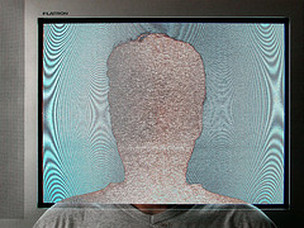 The Human Condition-Homage to Rene Magritte / [piXo] Not a week goes by that I don’t wonder if this will be the week I have nothing to write. Sometimes there’s not much to talk about and sometimes a lot happens. My original reason for writing was to encourage myself to search for the holy in the daily. But it wasn’t long before I focused on my own transformative moments. I sense there is risk in all the introspection; not risk like running naked through a flower-show but more of a “ho-hum” risk. What could be worth reading about this ordinary life?
Luckily, I often find someone else’s insights to justify doing a weekly self-disclosure. In his forward to David Shield’s Enough About YOU, Notes Toward the New Autobiography, documentary filmmaker, Ross McElwee writes “ …each of us plumbed deeply enough and from enough angles contains the entire human condition.” I like that justification for these weekly explorations – “the entire human condition.”
This week was filled with exciting options that included a day at the Zen Center learning about satipatthana, the framework for establishing mindfulness, with Gil Fronsdal; attending Acid Test, a play about Ram Dass, followed by dinner with Corky; a meeting with my meditation practice teacher who told me “no” and I didn’t cry; and being with my darling therapist, practicing asking for an apology. But I choose to spend the remaining paragraphs playing with a moment of truth from early in the week when Corky said something to me that hit home. I trust that this will speak to the entire human condition.
Corky and I needed to talk about what had happened a few nights earlier when we went to hear author Mary Roach at the Jewish Community Center. Before the lights went down my feelings were hurt, and rather than express anger at Corky, I chose to weep silently in the dimness of Kanbar Hall as Ms. Roach burbled on about flatulence and gastrointestinal juices. When Corky asked me on the ride home if something was wrong, I acknowledged feeling disrespected by what felt like her disinterest in what I was saying about myself. We set a time to talk it over. Good idea. Resentment rarely serves relationship.
A few days later we met in the patio of ‘Arlequin, sat in the sun and looked back at the incident at the JCC. In cases of hurt feelings I like to say to myself: “Hurt people hurt people.” So what had hurt Corky?
I will say here only what I understood from what she said. Her complaint was that I seem so self-absorbed that she wonders if there is any room in me for anyone else. She made a valid point. Hers is the same plaint one might make of a fishing enthusiast who chooses to spend most of his waking hours on the water. Such preoccupation tends to leave little room for anyone but a fellow enthusiast. And it is clearly irrational to expect anyone else to be as caught up in my insights and exhalations as I am. Or as I hope, on occasion, you are, keeping in mind “The Entire Human Condition.”
Anyway, I took to heart her lament. It is true. I do love to examine being me. And yet, I remember reading Pema Chodron about “self-cherishing” which is not so much about loving the self as it is about preoccupation with self, with fixing. I am grateful to Corky for saying my self-absorption made her feel left her out, much as I had, in the past, found her affection for old movies and audiobooks sometimes tiresome and excluding.
And yet what seemed called for on this occasion was less looking back and more thinking forward as to how to create a “we” space and time to be about and for each other. So I proposed a plan whereby no day goes by without kind words for the other, and emails don’t count. Kind words and time together is key, time during which we pay attention to each other. Of course, I have no control over how much attention I get. But that is not a problem. I am notoriously good at being attentive to myself.
Thus with the help of everyone who wants to be in relationship with me, especially Corky, it will be my practice to be at home in self-awareness while holding the door open to others. Welcome to my human condition.
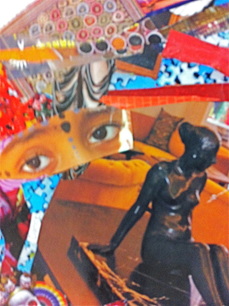 From a collage by Susan Miller / Alison R. To make a susan shaped space is to mark off in your heart those parts of you that would be different or less had you not had a friend like Susan Miller in your life.
Sunday, the Mothertongue Feminist Theater Collective put on a celebration ceremony honoring Susan (Shoshanna) Merilyn Miller for women who knew and valued her friendship. As part of the program Lori Rillera sang “my miracle,” a song she wrote to express her deep affection for this woman who had been old enough to be her mother.
”I’m thinking of you
there’s a
susan shaped space
filled in my heart
you’re here
when I sing
and laugh
and dance
and make art”
Lori said that Susan would say to her that she was the same age as the daughter she gave up for adoption.
Alhough I did not know Susan well, I had been to some of the same gatherings and had followed the progression of her illness through postings by her good friends Corky Wick and Lori. They, with Susan, were members of Mothertongue with whom she had performed her written pieces about women’s experiences for more than 25 years.
Taken from venues where Susan is said to have read them animatedly, about 30 pieces were arranged to be read and filmed on Sunday. They were varied – childhood recollections of her love for her sister, her memory of lying on the bathroom floor begging god to help her breathe so she would not have to disturb her parents on a night they seemed to be getting along, her ongoing battles with asthma and eczema, her yearning to be loved, her sexuality, and her bisexuality, a fact she liked to make clear by speaking and writing the word in all capital letters.
From among her writings, I chose to go to the microphone and read “A Good Day,” a piece I picked because on that day everything had gone well for her, even her doctors’ appointments. I knew from Corky that Susan’s life had been filled with illness, so I felt glad and less intrusive to share in a day she felt free of pain, a day spent with her sister joyfully. I did not feel entitled to read intimate accounts – her playful musings about masturbation, or her yearnings to have someone make love to her – not that I haven’t known both.
Robin Song opened the program by lighting a candle against a backdrop of collages and drawings Susan created. These art works clipped to twine by tiny clothespins were for friends to take as were pieces of her jewelry, her scarves, jackets and other clothes.
Robin included a ritual dropping of smooth and lovely stones into a translucent bowl of water after each woman read one of Susan’s writings. These stones, Robin said, remind us that what we give of ourselves ripples out. Our lives invariably touch other lives, whether or not we think so.
At the conclusion of the ceremony, music for dancing played through the meeting room at Strawberry Creek Lodge in North Berkeley and the women who knew and loved Susan moved as they were able in body or spirit, waving Susan’s scarves or sharing with each other the clothes they wore that had once been hers.
“i was waiting for you
holding your place
till you got well
a susan-shaped space
no other dancer
could grace
|
 The Letter F / Kevin H.
The Letter F / Kevin H. 








 RSS Feed
RSS Feed